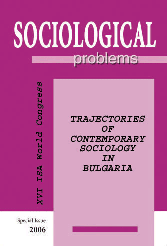Cultural Identity as an Everyday Life and an Ideal
Cultural Identity as an Everyday Life and an Ideal
Author(s): Tanya NedelchevaSubject(s): Social Sciences
Published by: Институт по философия и социология при БАН
Summary/Abstract: Cultural identity is a phenomenon that accompanies the contemporary social situation, specifically the de-centering of the nation state, the formation of a global civil society, the growing density of social time and space, and the multiplication of social roles. Contemporary society is increasingly exhausting its integrative capacities, based on the political, economic or institutional factors. The life world, a basic component of which is culture, is coming to possess a great part of the social resources. Life world is a specific whole that integrates cultural heritage and the linguistically organized supply of models of interpretation, on the basis of which individuals and groups affirm themselves in the world, dealing with concrete situations. In this complex situation emerges the equal respect of each individual not only for the people of one’s own common root, but for the personality of the other or others in their otherness. And standing up in solidarity for the Other as one of us, is connected with the mobile ‘we’ of a community, which opposes all that is substantial, and is constantly extending its permeable boundaries. This moral community is constituted only through the negative idea of overcoming discrimination and suffering as well as of including the marginalized people – and the marginalized individual – in relations of mutual respect. This constructively designed community is not a collective that forces its ‘uniform’ members to accept its own notions. Inclusion here does not imply closing oneself within One’s own and locking oneself against the Other. ‘Inclusion of the Other’ signifies that the boundaries of the community are open to all – also and precisely for those who are and want to remain Strangers to one another. Cultural identity also exists as a tendency – an actual restructuring of the social substance, and as a constructive idea with reference to which certain realities are modeled. Thus, in cultural identity facts and norms, the present and the prospective, co-exist. As a form of co-experiencing-otherness this identity requires and imposes not a single model of life but a network of various cultures and a variety of ethos, organic connection of the modern reflexivity, neighborhood of different symbolic depictions, a unique cultural semantics and dialogue. Hence it lies at the basis of globalization in solidarity, where universal human rights are respected, the rights of all citizens of all nations. Today we are only at the threshold of cultural identity as a co-experiencing-otherness and we must make it real both as a part of our humble everyday life and as a great ideal.
Journal: Социологически проблеми
- Issue Year: 38/2006
- Issue No: Special
- Page Range: 76-88
- Page Count: 13
- Language: English
- Content File-PDF

